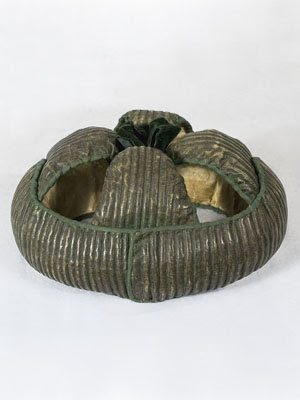 |
| Courtesy http://www.ancestryimages.com |
Woe to
those convicted, we learn! In
addition to fines, London’s criminal element faced the likelihood of branding and
transportation to distant colonies.
Given my
interest in historic textiles in general and shoes in particular, this theft
from London shopkeeper Ann Lenson’s establishment caught my attention. Clearly, petty theft and larceny were
the bane of a storekeeper’s or artisan’s existence.
The theft
occurred 25 November 1742, and the criminal case was heard at the Old Bailey on
8 December 1742. There were
several perpetrators involved who gained access by pushing open a window. In
addition to the two men who actually stole the items, Patience Forrester “fenced” some of the stolen goods.
Among other items, she testified that she sold a velvet manteel to Duke
William's footman. (Many household and livered servants would acquire their
finery second hand in shops or at the Rag Fair.) When the proprietor, Ann Lenson, was asked the value of the
goods, she noted that they were about 40s and that they were all "second
hand things."
Stolen from Lenson’s shop were:
2 velvet
mantels [mantels]
15 pair
of women's kid gloves
1 pair of
white damask shoes with gold lace [metallic thread lace or braid]
1 pair
flowered silk shoes
7 yards
of black silk
1 rowler
for a child's head [also known as a “pudding cap]
1
brocaded shoe [only one not a pair]
Several
yards of lace [metallic thread braid]
1 snuff
box
One of the suspects admitted,
along with the silk, "three pieces of brigade" [sic - brocade] & that the pudding was "done with gold."
As these were second-hand goods, the shoes stolen were probably
completed at bit earlier, say 1740.
The white damask shoe with gold lace was probably was similar to
these:
While the flowered silk shoes or the brocaded shoe may have looked something like
this:
Note the distinctive weighty- some might say "sensible"- covered Louis heel and pointy toe popular during the 1730s-1740s. (All shoes pictured here at courtesy of www.eng.shoe-icons.com.)
The child’s “rowler” or pudding had gold thread and may have looked something like this.
The child’s “rowler” or pudding had gold thread and may have looked something like this.
 |
| Pudding & cap Courtesy, Colonial Williamsburg Foundation |
 |
Child's stuffed leather pudding cap, c.1775.
Courtesy www.VintageTextile.com
|
The several yards of what was then called lace, may have resembled
this sample:
It was quite dear.
All three culprits were found guilty and sentenced to transportation to the colonies.
All three culprits were found guilty and sentenced to transportation to the colonies.





You will discover choice of all accessories like Women Fashion Clothing and Women Fashion Clothes.
ReplyDeleteWomen Fashion Clothes